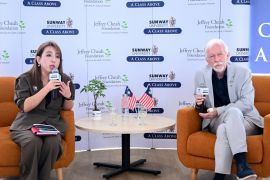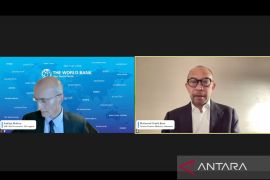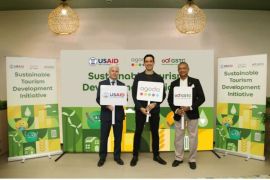"The present world is full of injustice. The new challenge is how to forge international cooperation based on justice and equality," Jokowi said.Jakarta (ANTARA News) - President Joko "Jokowi" Widodo is of the viewpoint that the future of the world lies in the hands of Asia and Africa, thanks to their human resources and huge economic potential.
Therefore, Asian and African countries need to establish cooperation, which will be able to transform the Asian and African regions into advanced and prosperous regions, Jokowi stated in his opening remarks at the Asian-African Leaders Summit held to mark the 60th commemoration of the Asian-African Conference, here, Wednesday.
"The present world is full of injustice. The new challenge is how to forge international cooperation based on justice and equality," he noted.
He believes that a collective global leadership is needed to address the imbalances in both global political and economic architectures as they have prevented the Asian and African countries from making progress.
"Indonesia is ready to establish cooperation with every party to realize the ideals. Today and tomorrow, we are gathering in Jakarta to answer those challenges. Today and tomorrow, the world is waiting for us to take steps to ensure that the Asian and African nations stand equally," President Jokowi affirmed.
President Jokowi along with Zimbabwean President Robert Mugabe co-chaired the first plenary session of the Asian-African Leaders Summit at the Jakarta Convention Centre, here, Wednesday.
During the first plenary session, Indonesian Foreign Affairs Minister Retno L.P. Marsudi announced the results of the Senior Officials Meeting (SOM) and Ministerial Meeting held respectively on April 19 and 20, 2015.
Chairman of the Indonesian Chamber of Commerce and Industry (KADIN) Suryo Bambang Sulisto also read out the results of the Asian-African Business Summit held on April 22, 2015.
Jokowi invited Mugabe to share his views, which was followed by speeches from Chinese President Xi Jinping and Jordanian King Abdullah II.
Other leaders attending the summit included Japanese Prime Minister Shinzo Abe, Sultan of Brunei Darussalam Hasanal Bolkiah, Cambodian Prime Minister Hun Sen, Bangladeshi Prime Minister Sheikh Hasina, Timor Leste President Taur Matan Ruak, Palestinian Prime Minister Rami Al Hamdallah, Iranian President Hassan Rouhani, Thai Prime Minister Prayut Chan, and Singaporean Prime Minister Lee Hsien Loong.
The first AAC was held in Bandung, West Java, in April 1955, at the initiative of Indonesia, Myanmar (Burma), Ceylon (Sri Lanka), India, and Pakistan.
It was viewed as a symbol of liberating countries from colonialism, besides being a symbol of resurgence of Asian and African nations.
Some 29 countries representing more than half the worlds population had sent their delegates to the conference.
The conference resulted in the "Dasasila" Bandung, or the 10-point Bandung Declaration, on the Promotion of World Peace and Cooperation.
Six decades since the first AAC, all countries have gained independence except for Palestine, which is still occupied by Zionist Israel and has faced apartheid since 1947.(*)
Editor: Heru Purwanto
Copyright © ANTARA 2015











